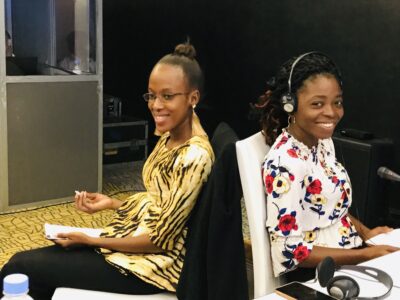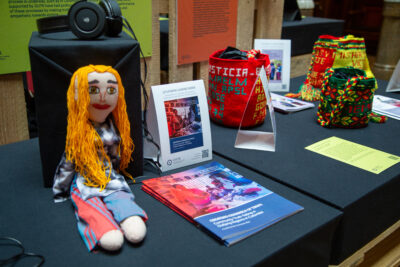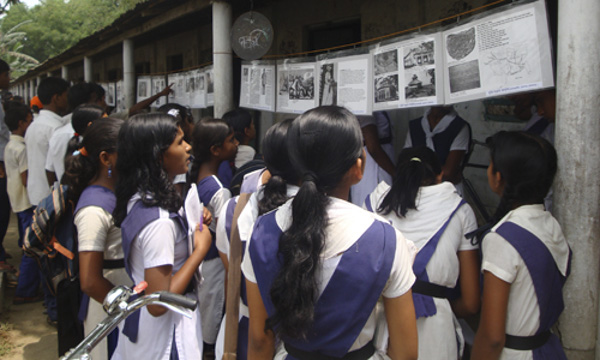With generous support from the Ford Foundation, the International Coalition of Sites of Conscience (ICSC) establishes a global academy that will equip human rights defenders to tackle the historic roots and contemporary impacts of racial inequity, climate injustice and discrimination in their communities.

PRESS RELEASE
New York, NY, October 10, 2024
Over the last decade, the world has seen an unprecedented rise in violent conflicts and mass human rights violations, resulting in more than a quarter of the world’s population living in conflict-affected environments. At the same time, the World Health Organization reports that 3.6 billion people reside in areas highly susceptible to climate change. In both contexts, impoverished and marginalized people are disproportionately bearing the brunt of these crises, as they have for generations.
To counter these trends, the International Coalition of Sites of Conscience is launching UNITE, an academy that will equip nearly 100 human rights activists the world over with new skills, connections and financial support to fight historic inequities at the root of conflict, climate injustice and discrimination.“At the Ford Foundation, we are steadfast in our belief that those closest to the problems are the ones who hold the keys to impactful and lasting solutions. UNITE is a bold initiative that recognizes the value of empowering the next generation of leaders to tackle the intersecting crises, from racial and gender discrimination to climate change, that they face firsthand,” said Juliet Mureriwa, Senior Program Officer at the Ford Foundation, one of UNITE’s inaugural funders. “By grounding these young leaders in the experiences and context they need to think critically, we can better find innovative solutions for change, because we can’t achieve a brighter future without first learning our lessons from the past.”
Through UNITE, ICSC will facilitate an academy with three specific tracks focusing on 1) how the legacies of colonialism and slavery manifest as systemic racism today; 2) how histories of domination and exclusion related to Indigenous rights, land rights and economic rights inform climate change’s impact on the poor and marginalized; and 3) how elevating historically silenced narratives of women, victims and other excluded communities can counter the extremism and discrimination so prevalent in contemporary societies.
The academy will bring together human rights defenders from Africa, Asia, Latin America, the Middle East and North Africa (MENA), and ethnic and racial minority groups in Europe and North America. Through training and advising, ICSC will equip participants with new skills to develop context-specific, victim-centered and gender-responsive memory initiatives in their local communities.
In addition, financial and programmatic support will be available to all participants to develop relevant pilot initiatives in their communities, such as exhibitions, dialogues and oral histories. These projects will not only improve participants’ practical skills, but engage over 2000 community members in causes that support social and climate justice. They are also intended to be easily replicable to support similar projects in other contexts.
“ICSC’s success in catalyzing effective global action is grounded in its commitment to and respect for local knowledge,” explains Executive Director Elizabeth Silkes. “Each community struggles with the legacies of historic oppression in their own way, so their solutions to the contemporary legacies of that oppression in the form of systemic injustice must be tailored to their context in order to be both effective and sustainable.”
UNITE will benefit from ICSC’s Sites of Conscience members which include over 370 historic sites and museums in more than 70 countries, in addition to its vast network of ally organizations. These connections form a one-of-a-kind learning community that allow human rights defenders to learn from others facing similar struggles, and offer them the strength and solidarity that comes from being a part of a global movement for memory, truth and justice. All academy participants will have opportunities to gather in person to share learnings, evaluate progress and amplify the lessons learned worldwide.

“UNITE will position participants to lift up similarities and differences in lived experiences of historic and contemporary human rights violations. In doing so it is launching a Global Conscience Corps of activists, civil society actors and human rights defenders who can raise universal awareness about the powerful role memory can play in eradicating injustice today. We could not be more excited about this program,” Silkes adds.
Since 2016, through its Global Initiative for Justice, Truth and Reconciliation (GIJTR), ICSC has led similar academies throughout Africa, Asia, Latin America and the Middle East and North Africa to build the capacity of activists in memorialization, transitional justice, forensics and media advocacy. One participant in a previous academy from the MENA region commented on the importance of comradery it provided. “The academy was excellent by all training standards. The skills and knowledge varied beautifully. The accompanying exchange experiences were valuable, particularly the field visit to a former detention center and listening to the experiences of young advocates working in post-war peace building.”
For more information on UNITE and how to get involved, please reach out to Ashley Nelson, Communications Director, ICSC, at anelson@sitesofconscience.org.

